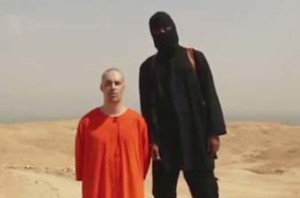
London, The jihadist who beheaded the American journalist James Foley in a video is believed to be the leader of a group of British fighters holding foreign hostages in Syria, the Guardian reported on Thursday quoting sources and former hostages.
The English-speaking militant was identified to the British newspaper by one of his former hostages as the ringleader of three British jihadists who are thought to be the main guards of foreign nationals in Raqqa, a stronghold of Islamic State (IS) rebels in Syria.
The militant, who called himself John and is believed to be from London, was said to be the main rebel negotiator during talks earlier this year to release 11 IS hostages. The Guardian reported that its sources in Syria had recognised the man as a pointman for hostage negotiations in Raqqa, where he is said to have held discussions with several families of jailed foreign nationals over the internet.
One former hostage, held for a year in Raqqa, told the Guardian the Briton was intelligent, educated and a devout believer in radical Islamic teachings. The three UK-born militants were referred to as “the Beatles” by fellow hostages because of their nationality, the former captive added.
Britain’s foreign secretary Philip Hammond said the country’s intelligence services would work closely with the United States to try to identify the man and a specialist counter-terrorism police unit launched an investigation into the contents of the video.
But he said he was not surprised to hear the executioner’s British accent as the government has repeatedly voiced concerns aboutrising numbers of British youths heading overseas to fight in Syria or other conflicts then potentially posing a risk in their home country when they return.
“We are absolutely aware that there are significant numbers of British nationals involved in terrible crimes, probably in the commission of atrocities, making Jihad with (IS) and other extremist organisations,” Hammond said.
Britain, which has about 2.7 million Muslims in its 63 million population, has been considered a prime target for militant Islamists since the 9/11 attacks in the United States and has been fearful of its nationals travelling to militant training camps abroad then posing a security risk at home.
That concern heightened after four young British Islamists, two of whom had been to al Qaeda camps in Pakistan, killed 52 people in suicide bomb attacks on London in July 2005.
Experts say young British men are often driven into the arms of jihadist groups such as the Islamic State (IS) by adolescent feelings of alienation, often resulting from their backgrounds as second or third generation of immigrant families, as well as poor economic prospects which they contrast with the perceived glory of bloody martyrdom.
Richard Barrett, ex-head of counter-terrorism at the MI6 overseas security agency, told the BBC in June that the number who had gone to fight in Syria and Iraq “could be as high as 500 by now”.
In February this year, Islamist fighters released a video of what they said was a British man carrying out a suicide bombing on a prison in Aleppo and several young British nationals have reportedly been killed in fighting this year.
British authorities have estimated up to 500 British nationals have travelled to Syria and Iraq to fight for Islamist militants.
Britain’s Prime Minister David Cameron also said on Wednesday it seemed “increasingly likely” that a British jihadist executed the US journalist.
“Let me condemn the barbaric and brutal act that has taken place and let’s be clear what this act is — it is an act of murder, and murder without any justification,” Cameron told reporters.
“We have not identified the individual responsible, but from what we have seen it looks increasingly likely that it is a British citizen.”
(With inputs from AP, AFP, Reuters)




 Driving Naari Programme launched in Chandigarh
Driving Naari Programme launched in Chandigarh






























